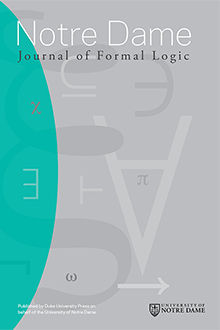Abstract
We present -Logic (Epsilon-I-Logic), a non-Fregean intuitionistic logic with a truth predicate and a falsity predicate as intuitionistic negation. is an extension and intuitionistic generalization of the classical logic (without quantifiers) designed by Sträter as a theory of truth with propositional self-reference. The intensional semantics of offers a new solution to semantic paradoxes. In the present paper we introduce an intuitionistic semantics and study some semantic notions in this broader context. Also we enrich the quantifier-free language by the new connective < that expresses reference between statements and yields a finer characterization of intensional models. Our results in the intuitionistic setting lead to a clear distinction between the notion of denotation of a sentence and the here-proposed notion of extension of a sentence (both concepts are equivalent in the classical context). We generalize the Fregean Axiom to an intuitionistic version not valid in . A main result of the paper is the development of several model constructions. We construct intensional models and present a method for the construction of standard models which contain specific (self-)referential propositions.
Citation
Steffen Lewitzka. ": An Intuitionistic Logic without Fregean Axiom and with Predicates for Truth and Falsity." Notre Dame J. Formal Logic 50 (3) 275 - 301, 2009. https://doi.org/10.1215/00294527-2009-012
Information





